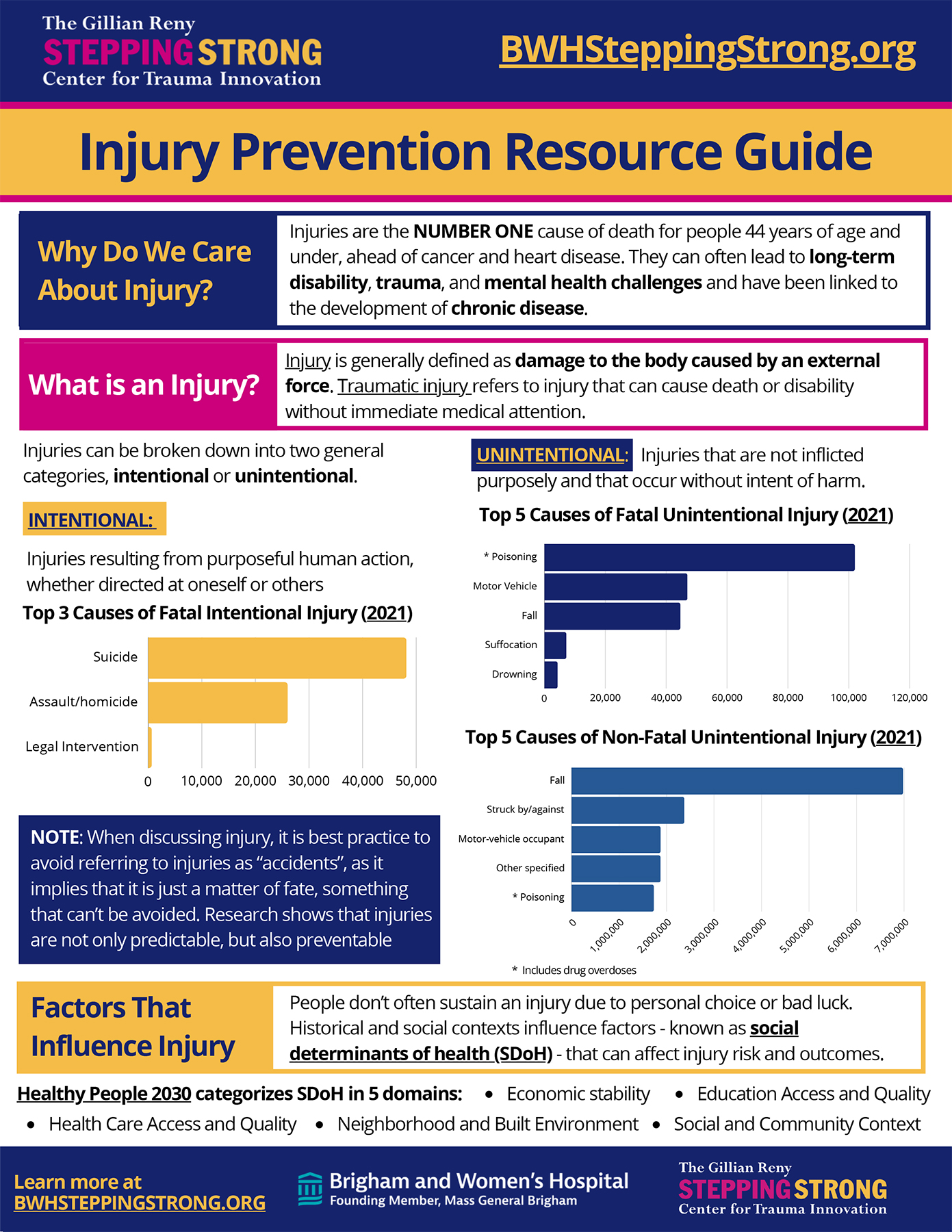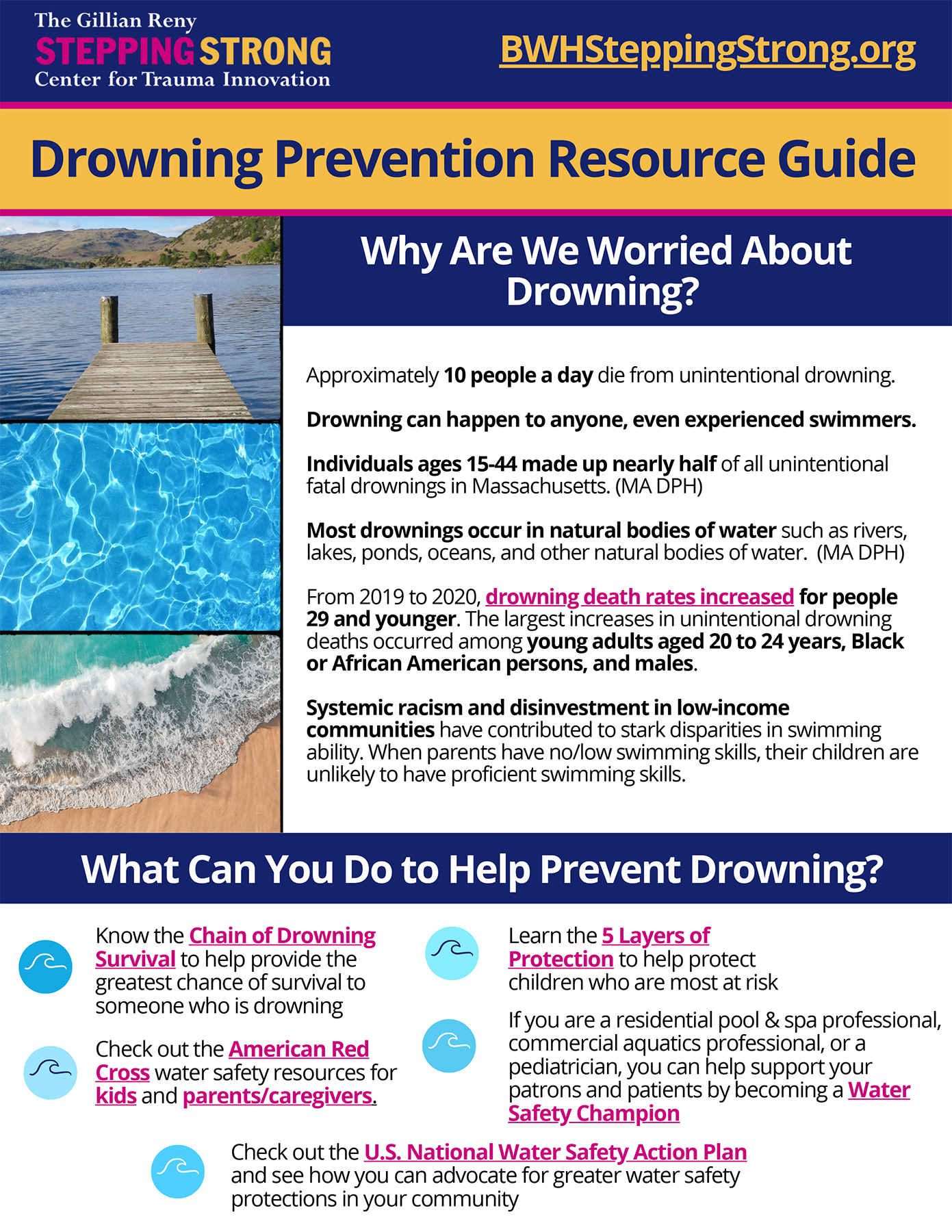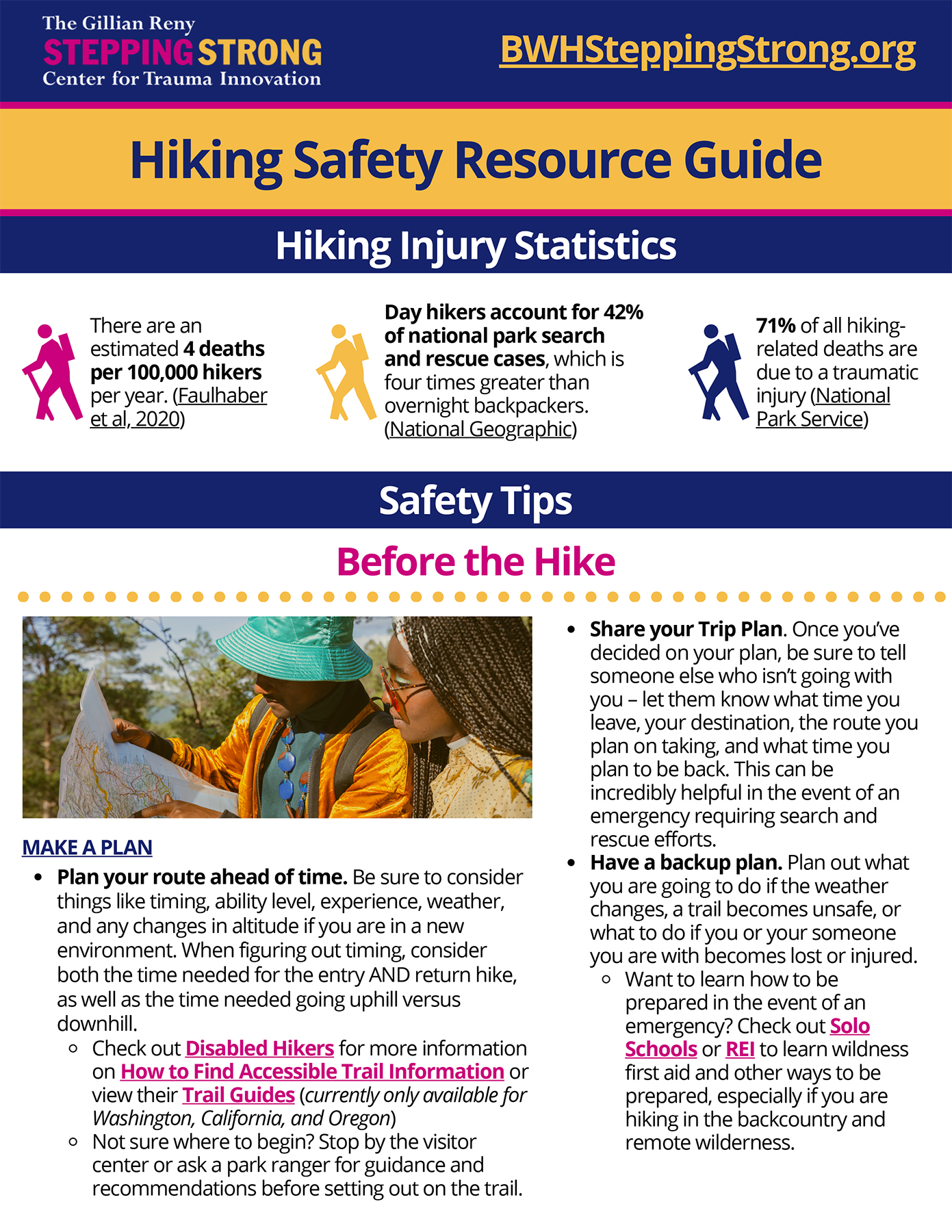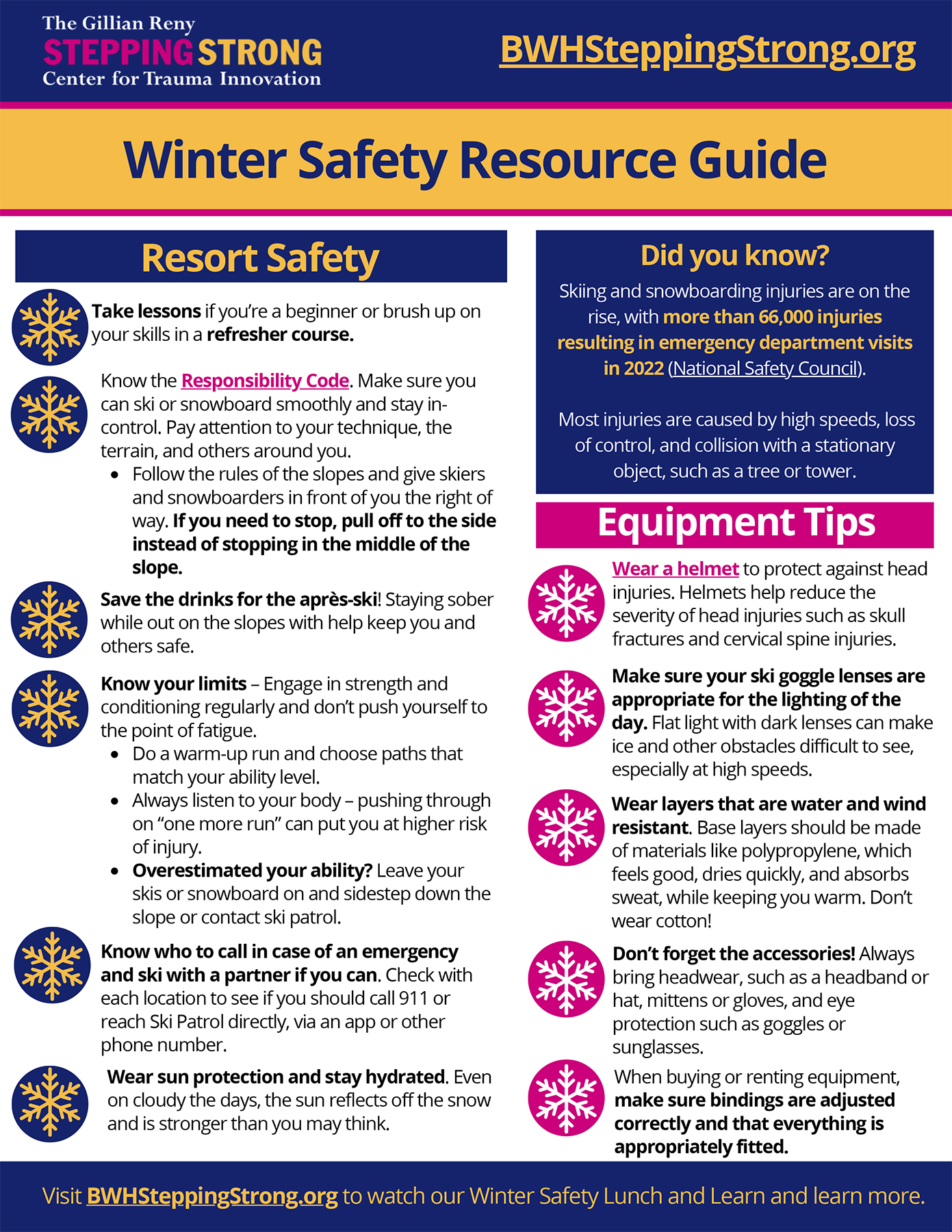
The Stepping Strong Injury Prevention Program (SSIPP) has compiled a list of resources to help mitigate the risk and severity of traumatic injuries and keep you and your loved ones safe.
![]()
Smoke Alarms and Carbon Monoxide Detectors
In 2021, there were 353,500 residential fires in the United States that caused more than 14,000 traumatic injuries or deaths. Read more below about how to keep your home protected with smoke alarms and carbon monoxide detectors.
Maintenance Tips
Combined smoke and carbon monoxide detectors are available. The following tips can be applied to individual smoke alarms and carbon monoxide detectors.
- Test batteries once per month
- Replace all detectors (battery operated and hard wired) every 10 years
- At the change of Daylight Saving Time (March and November), test and change the batteries in your smoke alarms and carbon monoxide detectors. If you have long life detectors, the batteries are expected to last 10 years, meaning you can test and change less frequently.
Resources
- MA Home Fire Campaign: 1-800-654-1234
- Sound the Alarm
![]()
Drowning is a global public health issue that is the leading cause of death for children ages 1-4 in the United States. Swimming lessons can be taught at any age and keep you protected in pools, oceans, lakes, ponds, and more. Read more below about water safety tips and available resources.
Tips to Stay Safe in the Water
- Learn how to swim
- Wear a U.S. Coast Guard-approved life jacket. Always wear a life jacket when boating, regardless of swimming skill.
- Only swim in designated areas and read all posted safety signs
- Have a “Water Watcher” in your group
- Never dive into water less than 10 feet deep
- Never prolong a breath hold underwater
- Be aware of hazards (strong currents, underwater debris, dangerous water temperatures, steep drop-offs)
- Never swim alone
- Swim sober
Resources

In 2022, nearly 50,000 people died by suicide. That is 1 death every 11 minutes. Suicide is a leading cause of death, yet it is preventable. Knowing the warning signs and how to help someone at risk can save a life.
Know the Signs of Suicide
- Emotional and Behavioral
- Feeling empty, hopeless, or trapped
- Changes in mood (sadness, anxiety, agitation)
- Changes in diet, sleeping, or habits
- History of living with suicidal thoughts
- Verbal
- Talking about unbearable pain, guilt, or shame to the point of no longer wanting to live
- Statements of being a burden to others
- Making a plan or researching ways to die
- Talking about wanting to die or how they can no longer go on
What You Can Do To Help
Suicide is preventable. Taking action and offering hope may save someone’s life.
- Question: if you’re concerned, it’s safe to ask about suicide
- Persuade by listening to them and giving them your full attention. Offer hope and support without judgment.
- Refer: take the person directly to someone who can help or get a commitment from them to accept help and make arrangements with them
The Stepping Strong Center offers QPR suicide prevention trainings for organizations and teams. Contact Veronica Topp for more information or to schedule.
Resources
- Local
- Crisis Text Line: Text HOME to 741741 to connect with a mental health crisis counselor in Massachusetts
- A Voice at the Table – Online community for suicide survivors and impacted friends and family based in Taunton, MA, with shared stories, videos, and live-stream events
- American Foundation for Suicide Prevention – Massachusetts – Suicide prevention community that organizes public events and fundraisers (available in multiple languages)
- Behavioral Health Helpline: Call or text 833-773-2445 any time (24/7) to speak with trained mental health workers in the Boston area who will help connect you to resources and follow-up. Available in more than 200 languages, people with hearing impairment can use the BHHL by contacting MassRelay at 711
- Boston Emergency Services Team (BEST) Hotline: Call 1-800-981-HELP (4357) any time (24/7) to connect with trained mental health professionals in the Boston area who can intervene in a crisis situation, evaluate, stabilize, and refer. The BEST team can also communicate via telehealth, direct you to their in-person walk-in urgent care centers, or come to you
- DeeDee’s Cry – Resources on suicide prevention and loss, and mental health education for BIPOC communities
- Massachusetts DPH Suicide Prevention Resources – List of hotlines and links to Massachusetts mental health resources (available in multiple languages)
- Massachusetts General Hospital Mental Health Resources for BIPOC – Links to local resources, BIPOC mental health provider directory, and further reading (available in multiple languages)
- Massachusetts Substance Abuse Helpline: Call 1-800-327-5050 or text 800327 any time (24/7) for a confidential hotline where trained specialists will refer you to harm reduction, treatment, and recovery services and follow up with you
- McLean Hospital – Information about understanding suicide, suicide prevention, and how to support friends and family, based in Belmont, MA
- NAMI Massachusetts Resources for the Black Community – Online communities, smartphone apps, and BIPOC therapists and prescribers
- Samaritans: 1-877-870-HOPE (4673), 24/7 volunteers who will listen about how you’re feeling and/or provide suggestions if you know someone who is struggling (available in 240 languages)
- National
- Call or text the 988 Lifeline or live chat at 988lifeline.org. 24/7 confidential support, suicide prevention, and crisis resources. TTY services for the hearing impaired, ASL services, Spanish-speaking counselors, interpreters for 240+ languages available, and special support for LGBTQ+ youth
- Alliance of Hope for Suicide Loss Survivors – Online community for those who have lost a loved one to suicide
- Black Emotional and Mental Health Collective (BEAM) – Resources, online community, events, grants, podcasts, and more for Black and marginalized communities
- Caring for Your Mental Health – Information about caring for your mental health in English and Spanish
- Emotional Wellness Toolkit – Strategies and tools for improving your mental and emotional health in English and Spanish
- Friends for Survival – Peer-to-peer support for people who have lost someone to suicide including monthly meetings, education, and newsletters
- Hey Sam – Text 439-726 (9 AM to Midnight ET) – Confidential peer-to-peer texting support for people up to 24 years old, staffed by young trained volunteers who will listen and support
- Opinion: Why we should all care about Black men’s mental health – Theologian, political advisor, and social justice scholar, Keith Magee, discusses Black men’s mental health struggles
- SAVE by SAMHSA – Education and support for those touched by suicide, and a community that raises awareness about suicide through events and fundraising
- SPRC Ideas for Action – List of actions everyone can take for Suicide Prevention Month
- The Trevor Project – 24/7 confidential crisis services, advocacy, community, and education for LGBTQ youth
- Vets4Warriors – Sustained, confidential peer support for veterans, service members, family members, and caregivers
- Emergency
- Boston Emergency Services Team (BEST) Hotline: Call 1-800-981-HELP (4357) any time (24/7) to connect with trained mental health professionals in the Boston area who can intervene in a crisis situation, evaluate, stabilize, and refer. The BEST team can also communicate via telehealth, direct you to their in-person walk-in urgent care centers, or come to you
- Boston Medical Center ER has a Psychiatric Emergency Services Department inside the ER: 725 Albany Street, Boston, MA 02118 Shapiro Center
- Call 911 and ask for a co-responder for someone with a mental health crisis if someone is in immediate danger of harming themselves or others. For example, if they have become actively aggressive, are assaulting people, or are unable to control what they’re doing
![]()
During periods of increased stress and time spent at home, it is important to ensure safe storage of medications and firearms to protect you and your family from unintentional injury.
Safe Storage Tips
- Store your medications and/or firearms in a locked cabinet, safe, or container.
- Gun locks cause guns to be inoperable and can be used in addition to storing the guns in a locked container.
- Store your firearm ammunition separate from your gun and store guns unloaded.
Safe Storage Resources
- Project ChildSafe
- Protect your children: store & use medications safely: Centers for Disease Control and Prevention (CDC)
- Reduce access to means of suicide: Suicide Prevention Resource Center
- Massachusetts and Rhode Island Poison Control Center: 1-800-222-1222
![]()
For some, home may not be a safe place. Victims of intimate partner violence (IPV) may be stuck at home with their abuser and unable to connect with friends, family, or coworkers, making them at increased risk of violence in the home. The complexity of their situations may also be exacerbated by additional marginalization, such as financial insecurity, structural racism, and/or other forms of oppression and discrimination. If you or someone you know is experiencing violence at home, know you are not alone. Here are some resources to help.
-
- Selected Intimate Partner Violence Research Articles by Stepping Strong Innovator Award Recipient Bharti Khurana, MD
- Upper extremity fractures due to intimate partner violence versus accidental causes
- Injury Patterns and Associated Demographics of Intimate Partner Violence in Older Adults Presenting to U.S. Emergency Departments
- Addressing intimate partner violence during the COVID-19 pandemic and beyond: how radiologists can make a difference
- Selected Intimate Partner Violence Research Articles by Stepping Strong Innovator Award Recipient Bharti Khurana, MD
Learn more about Dr. Khurana’s research.
- Brigham and Women’s Hospital Resources:
- Passageway (Domestic Violence): 617-732-8753 or passageway@partners.org
- Violence Recovery Program (Community Violence): 617-721-6034 or violenceprevention@partners.org
- Boston Neighborhood Trauma Team (Community Violence): 617-431-0215
- Massachusetts State Resources:
- If you need to speak to someone immediately about sexual or domestic violence, call Safelink at 1-877-785-2020 or TTY 1-877-521-2601
- DPH Domestic Violence Programs
- Jane Doe Inc.
- The Network La Red
- Boston Area Rape Crisis Center: 800-841-8371
- Asian Task Force Against Domestic Violence: 24/7 Multilingual Hotline: 617-338-2355
- National Resources:
![]()
Safe Driving Tips
- Slow down: Drive no faster than the designated speed limit
- Wear your seatbelt
- Drive sober
- Drive hands-free and undistracted
Pedestrian/Cyclist Safety
As a result of the COVID-19 pandemic, more people are taking up walking or cycling as a means of exercise and getting outside. It is important to practice safe measures when walking or cycling.
Pedestrian Safety Tips
- Use crosswalks and sidewalks whenever possible
- Refrain from walking at non-daylight hours. If walking at night, make sure to wear light, visible clothing or reflectors so that you are more visible to cars
- Never assume a driver sees you
Cyclist Safety Tips
- Wear a helmet while riding
- Use a bike lane when possible
- Plan your route on less crowded roadways
- Ride a bike that works and fits you
- Ride hands-free and sober
Pedestrian/Cyclist Safety Resources
![]()
It is important to practice safety measures that keep you and your family safe in the home.
Home Safety Tips
- Falls Prevention
- Talk to your provider about having a falls risk assessment
- Do not rush to answer the phone
- Refrain from wearing non-slip footwear like slippers, sandals, or high heels
- Use your cane or walker instead of holding on to furniture for stability
- Make sure your hallways and stairs are well lit—place night lights and bedside lamps in rooms
- Tape all throw rugs to the floor
- Place rubbers mats in the bathtub to prevent slipping
- Make sure electrical cords are organized and out of the way
- Burn Prevention
- Install smoke alarms on every floor of your home, especially near sleeping areas. Check batteries every six months
- Develop and practice a fire escape plan
- Blow candles out before leaving the room or going to sleep
- Use safe cooking practices: never leave a stove unattended
- Have a fire extinguisher in the kitchen in case of an emergency
- Poison Prevention
- Store poisonous substances in a locked cabinet or up and away from children. These substances include medications, household cleaners, alcohol, etc.
- Keep all poisonous products in their original containers
- If you suspect a poisoning has occurred, call the National Poison Help Hotline at 1-800-222-1222 for guidance from poison control professionals




